- Faculty News
- Student News
- Lab News
- Publications
- Meetings and Presentations
- Outreach
- Grants
- Announcements
- About This Newsletter
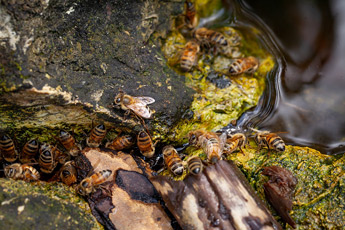
ABOVE: Bees from the Honey Bee Research and Extension Lab next door collecting water from the Steinmetz courtyard pond. Photo by Matt Borden.
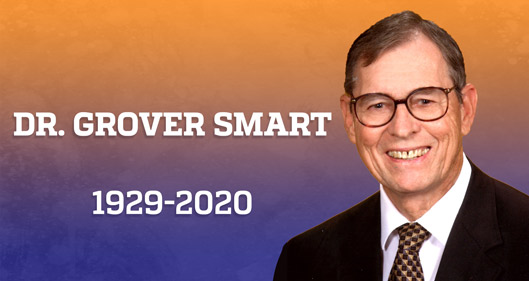
Dr. Grover Smart Jr. passed away January 7th. He was a faculty member in the UF Entomology and Nematology Department. Smart began teaching at UF in 1964 and worked many years before he retired as a full professor. In addition to his teaching and research, Dr. Smart served as our department’s Assistant Chairman, Interim Chairman, and Graduate Coordinator.
Generations of former UF graduate students, including myself, were taught Nematode Taxonomy and Systematics, and Nematode Morphology and Anatomy by Dr. Smart and his Biological Scientist Dr. Nguyen. Dr. Smart was an excellent teacher and was both demanding and patient. I will always remember him laughing at my feeble attempts to draw nematode morphological features.
Dr. Smart’s early-career research focus was on plant-parasitic nematodes, particularly root-knot nematodes; however, his mid to late career focus was on entomopathogenic nematodes and this is where he made his biggest impacts. He told me that the thing he was most proud of was being a key player along with Howard Frank in the release of Steinernema scapterisci in the US for biological control of invasive mole crickets. I recently got to visit with him in the care center and his face lit up when I told him that people in Dr. Dale’s lab were continuing research with that nematode.
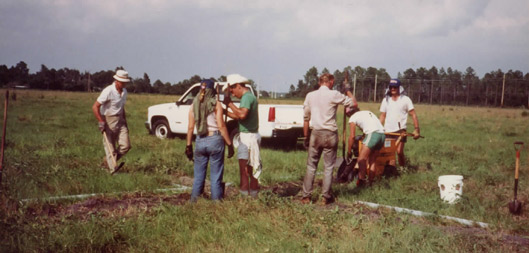
ABOVE: Dr. Smart (far left) and Dr. Frank (center) installing mole-cricket traps in study of Steinernema scaperisci.


ABOVE: Dr. Estelle Martin (left) and Dr. Phil Hahn (right) started this January. Welcome to UF Entomology and Nematology Department!
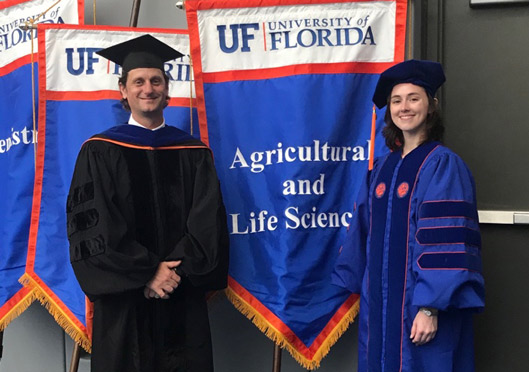
ABOVE: Dr. Bethany McGregor’s dissertation was selected as the Department’s nomination for the College of Agricultural and Life Sciences “Award of Excellence for Graduate Research.” Bethany completed her degree in May, 2019 under the direction of Dr. Nathan Burkett-Cadena at the Florida Medical Entomology Laboratory. Photo is from her spring commencement.

We welcome nine new graduate students to the Department this spring:
Ph.D. students joining us are:
James Brown—Gainesville (Liburd
)
Derrick Conover—Quincy (Martini)
New MS students are:
Theodore Black—Vero Beach (Burkett-Cadena)
Chad Cross—Distance
Brandon Dilella—Ft. Lauderdale (Bahder)
Bethany Eutsey—Distance
Garima—Homestead (Seal)
Lourdes Perez Cordero—Lake Alfred (Diepenbrock)
Marina Spurrier—Distance
It is great to have them with us!
Need to name that bug? A host of experts are available to help Floridians identify any insect or related arthropod. If a mystery creature has six or more legs, the UF Insect ID Lab is the place to call.
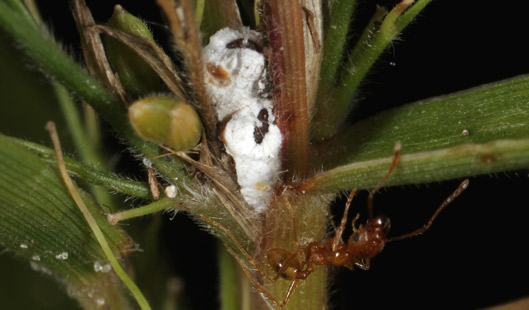
ABOVE: Mealybugs in the genus Antonina live on grasses, including bamboo. Adult females are legless and enclosed in a white ovisac. The Rhodesgrass
mealybug, Antonina graminis, is a pest of turf grasses. These specimens in Lyle Buss’s yard were being tended by a nearby colony of bigheaded ants, Pheidole morrisii.
If you need insect images for a publication or presentation for your UF/IFAS Extension or teaching work, you can go to this direct link, pictures are copyrighted material and intended for official UF use only. Log onto the website using your Gatorlink credentials.
Lyle Buss is the UF/IFAS Insect ID Lab manager.
 Think it might be a nematode problem? The Nematode Assay Laboratory serves Florida and other states by providing nematode assays and expert advice regarding nematode management.
Think it might be a nematode problem? The Nematode Assay Laboratory serves Florida and other states by providing nematode assays and expert advice regarding nematode management.
For more information on the Nematode Assay Laboratory, please contact the lab manager Dr. Billy Crow.
Campbell LP, Reuman DC, Lutomiah J, Peterson AT, Linthicum KJ, Britch SC, Anyamba A, Sang R. (2019). Predicting abundances of Aedes mcintoshi, a primary Rift Valley fever virus mosquito vector. PLoS ONE. https://doi.org/10.1371/journal.pone.0226617
Frank JH. 2019. A brief history of Frederick D. Bennett’s entomological career. Florida Entomologist 102: 763-766.
Frank JH. 2019. Frederick D. Bennett’s scientific publications and reports. Florida Entomologist 102: 767-774.
Grodsky SM, Hernandez RR, Campbell JW, Hinson KR, Keller O, Fritts SR, Homyack JA, Moorman CE. 2019. Ground beetle (Coleoptera: Carabidae) response to harvest residue removal: Implications for forest bioenergy production. Forests 11(1): 48. https://doi.org/10.3390/f11010048
Hinson KR, Keller O. 2019. New state record and notes on Philothermus puberulus Schwarz from North Carolina, U.S.A. The Coleopterists Bulletin 73(4): 1100-1101. https://doi.org/10.1649/0010-065X-73.4.1100
Ibanez F, Suh JH, Wang Y, Stelinski LL. 2019. Long-term, sustained feeding by Asian citrus psyllid disrupts salicylic acid homeostasis in sweet orange. BMC Plant Biology. 19: 493. https://doi.org/10.1186/s12870-019-2114-2
Johnston N, Stansly P, Stelinski LL. 2019. Secondary hosts of Asian citrus psyllid, Diaphorina citri Kuwayama: Survivorship and preference. Journal of Applied Entomology. 143:921-928.
Lee SB, Chouvenc T, Su NY. 2019. A reproductives excluder for subterranean termites in laboratory experiments. Journal of Economic Entomology 112(6): 2882-2887.
Patel JS, Chouvenc T, Su NY. 2019. Temperature preference of two invasive subterranean termite species and their hybrids (Blattodea: Rhinotermitidae: Coptotermes). Journal of Economic Entomology112(6): 2888-2893.
 New on Featured Creatures:
New on Featured Creatures:
European wool carder bee, Anthidium manicatum. Authors: Samantha Gallager and Andrea Lucky.
Conehead termite, Nasutitermes corniger (Motschulsky). Authors: Reina L. Tong, Katherine E. Tenn, and Rudolf H. Scheffrahn.
Do you have a favorite creature? Learn how to make it into a Featured Creatures!
Dr. Thomas Chouvenc was invited to give a workshop on December 11th to the Shady Banks civic association in Ft Lauderdale, FL, about the impact of invasive termites in south Florida. This community is particularly at risk of the Asian subterranean termites, and monitoring the urban tree canopy in this area is important step for early colony detection and control.
Dr. Bill Kern and Dr. Thomas Chouvenc provided a workshop to the pest control industry at the West Palm Beach Extension office, to discuss about invasive iguanas, delusional parasitosis and common pest ants in South Florida, on December 5th, West Palm Beach, FL.
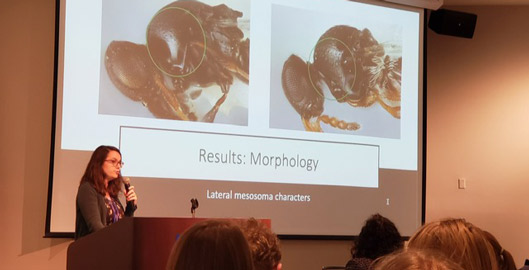
ABOVE: Jessica Awad, a master's student in the Hodges lab, presented a talk titled "Building a diagnostic framework for the parasitoid wasp genus Synopeas Förster" at the Society of Systematic Biologists 2020 meeting. The conference, "Systematics in the Swamp" took place in Gainesville, Florida, on January 3rd to the 6th.
Ph.D. student Jason Williams and postdoc Dr. Miles Zhang from the Lucky Lab gave two presentations at the Society of Systematic Biologists Meeting in Gainesville FL on January 3rd to the 6th: “Global domination by crazy ants: Phylogenomics reveals biogeographic history and invasive species relationships in the genus Nylanderia (Hymenoptera: Formicidae)”, and “Reinterpreting species limits using UCEs: Phylogenomics of Sycophila parasitic wasps associated with oak galls.”
![]() This January, five members of the Miller Lab headed to Austin, Texas to present their research at the 2020 Society for Integrative and Comparative Biology Annual Meeting. Tamsin Woodman, a visiting scholar, gave a poster presentation on how diet can influence the damage resistance of insect cuticle. Dr. Zachary Emberts, a recent Ph.D. graduate, presented on the evolution of autotomy in leaf-footed bugs. Kayli Sieber, an undergraduate researcher, presented on feeding facilitation in the leaf-footed cactus bug, Narnia femorata. Lauren Cirino, a Ph.D. candidate, gave a talk on how weapon damage can influence fitness. Finally, Emily Angelis, an undergraduate researcher, presented her work on the consequences of weapon loss on mating behavior.
This January, five members of the Miller Lab headed to Austin, Texas to present their research at the 2020 Society for Integrative and Comparative Biology Annual Meeting. Tamsin Woodman, a visiting scholar, gave a poster presentation on how diet can influence the damage resistance of insect cuticle. Dr. Zachary Emberts, a recent Ph.D. graduate, presented on the evolution of autotomy in leaf-footed bugs. Kayli Sieber, an undergraduate researcher, presented on feeding facilitation in the leaf-footed cactus bug, Narnia femorata. Lauren Cirino, a Ph.D. candidate, gave a talk on how weapon damage can influence fitness. Finally, Emily Angelis, an undergraduate researcher, presented her work on the consequences of weapon loss on mating behavior.
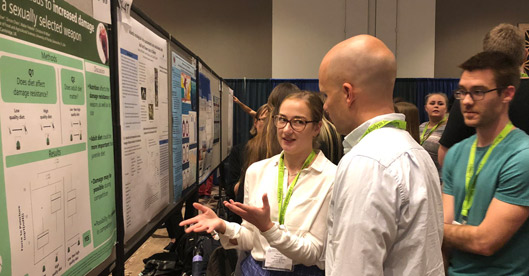
ABOVE: Tamsin Woodman, a visiting scholar, gave a poster presentation on how diet can influence the damage resistance of insect cuticle.
From the Outreach Coordinator
December Outreach Events:
Dec. 3rd- Ocala High School tour of Entomology: Clayton Bania, Clancy Short
Dec. 11th- Entomology tour Marion County Homeschool: Clayton Bania, Clancy Short
Dec 16th- STEM day at Bell Elementary: Clayton Bania
Dec 17th- Science Day at Trenton Elementary: Jessica Altum Cooper
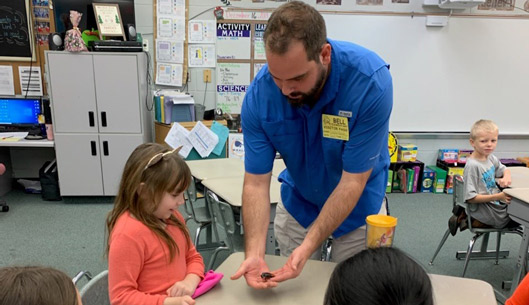
ABOVE: Outreach coordinator Clayton Bania shows students live insects at Bell Elementary for STEM day on December 16th.
The live critters are always a hit with children and adults alike. The critters are available for you to check out should you be leading an outreach event. We have doubles of our most popular critters, as well as various native insect species depending on the time of year. We have large wood and Plexiglas cages for viewing our native orb weaving spiders. There is one travel cage and one larger static cage. Please be sure to contact us and review the protocol on transporting and handling the critters if you are not already familiar with it. If you lead an outreach, be sure to fill out a documentation form so your event can be included in the newsletter and we can log all outreach events.
If you have any questions, please email me.
Thank you —Clayton Bania, Outreach Coordinator.
If you would like to schedule an event or have any outreach questions, go to the Outreach pages on our Bug Club website and contact us.
Getting social!
We have several social media sites for the Entomology & Nematology Department. To make them easily searchable, all three (YouTube, Facebook and Twitter) have the same page name: UFEntomology. Please share these links with past students or colleagues who may have an interest in departmental activities.
Dr. Lawrence Reeves, in collaboration with Dr. Nathan Burkett-Cadena, received funding ($45,100) through the American Mosquito Control Association Research Fund to investigate the impacts of mosquito control adulticides on butterflies and bees.
![]() Want grant writing tips? Check out the UF Libraries Grants Management Program!
Want grant writing tips? Check out the UF Libraries Grants Management Program!
Registration for the February UF Fume school 2020 is open. Register here.
![]() Want to stay up to date? Check out our website home page for a link to our Google calendar.
Want to stay up to date? Check out our website home page for a link to our Google calendar.
Suzy Rodriguez is the newsletter editor and does the HTML coding. Issues usually are published by mid-month. Submit items for an issue by the seventh of that month.
We like to share news when it happens using our social media outlets: Twitter, Facebook and YouTube. Follow us on these sites for daily updates! When you send news, we will post it on one or more of these sites and again in the monthly newsletter. Please be sure you have permission from people in photographs you submit for publication.
UF-Bugnews-L listserv subscribers receive notices when issues are posted. Our home page has instructions for subscribing and unsubscribing.
Special thanks to Eleanor Phillips and Nancy Sanders, who reviewed the newsletter for errors, and to Jane Medley and Don Wasik, who built the web page design.
Give Back
Want to support the UF Entomology & Nematology Department? Consider making an online gift today! Questions can be directed to Christy Chiarelli at (352) 392-1975 or ccw@ufl.edu.